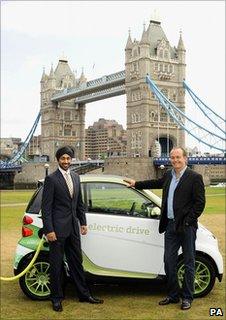Advisors urge new UK climate policies
- Published

A step-change in renewable capacity is part of the committee's prescription
Major changes in policy are still needed to meet climate targets despite emission cuts brought about by the recession, say government advisors.
The Committee on Climate Change (CCC) calls for a "step change" in power generation, insulation and transport.
Continuing to rely on "light touch" approaches will not work, it says.
The government says it is committed to being "the greenest ever", and is expected to bring in new energy legislation within its first year.
The is the committee's second annual report to parliament, and follows a year in which UK greenhouse gas emissions plummeted by 8.6%, mainly due to the recession but also because of increased fossil fuel prices.
"The recession has created the illusion that progress is being made to reduce emissions," said CCC chairman Lord Adair Turner.
"Our analysis shows that this is almost wholly due to a reduction in economic activity, and not from new measures being introduced to tackle climate change.
"So we are repeating our call for new policy approaches to drive the required step change, in order that the UK can ensure a low-carbon recovery."
Price cuts
The committee selects four areas where it says the step change needs to occur:
Electricity generation, where the market needs to be reformed to take account of strategic priorities, with new "carrots and sticks" persuading generators to adopt low-carbon technologies, including early demonstration of "clean gas" technology and perhaps a minimum price on carbon
A greater push towards home insulation
Setting more ambitious targets for the number of electric cars on the road, and protecting funds aimed at speeding their introduction
Encouraging farmers to use fertilisers more efficiently, reducing emissions and cost.
"We had less than 1 Gigawatt (GW) of renewable capacity added to the system in 2009," said CCC chief executive David Kennedy.

The committee says the government must protect funding for electric cars
"We need in the order of 2-2.5GW added each year over the next 10 years in order to meet our carbon budget and European targets for renewables.
"Is it going to happen in its own? No; we've had a light touch approach for years in the UK, we've talked a good game, but we've seen that emissions haven't reduced enough as a result of policies."
UK emissions are currently 26% below the 1990 level - the baseline year most commonly used national, European and global policy.
Until 2008, most of this fall was down to the "dash for gas" in the early 1990s and a halving of methane emissions.
But the significance of the recession is shown in the government's recent admission that the 8.6% fall from 2008 to 2009 was the largest single-year decline in the entire record.
The fall, said Mr Kennedy, makes it feasible for the UK to increase its 2020 target from the current 34% emission cut to 42% - the UK's projected share should the EU move from its current 20% target to 30%, as the government is urging.
But the committee stops short of recommending a unilateral move at this stage.
Green dealing
Responding to the committee's report, Energy and Climate Change Secretary Chris Huhne said: "As the Climate Change Committee makes clear, we mustn't rely on economic recession to cut emissions.
"There has to be an enduring shift to low carbon, driving growth in new technologies, and it must be locked into the fabric of our economy in good times and bad."
He noted that the coalition government was planning to overhaul domestic energy efficiency through its "Green Deal" scheme, and was working to to create a Green Investment Bank to help low carbon investment.
But Mr Kennedy said there was a lack of clarity about government plans in some key areas, including electric transport, reforming the electricity industry, and how fast home insulation would proceed and how it would be funded,.
"It is realistic to think we could double the pace of loft and cavity wall insulation in two or three years if we get the policies in place now," he said.
"The coalition agreement has good stuff in it, but it's very top-level - and the test of the government will be the policies they put in place over the next one to two years."
On the transport side, he noted that the UK has a substantial engine-manufacturing business, and said that the future for those companies must lie in low-carbon engines, notably those powered by electricity.
Environment groups used the report to call on the government for faster action on emissions.
"It is clear that the UK's current climate and energy policies are not delivering, and the Committee on Climate Change is right to call for a step change," said Keith Allott, head of climate change with WWF UK.
"The new government should act quickly to adopt the 42% target - this would lay the foundations for a green economic recovery, and also allow the UK to show true leadership in Europe and internationally."
Paul King, chief executive of the UK Green Council, said: "The committee is right to highlight the importance of our built environment.
"We need a massive programme of refurbishment for our homes, businesses and public buildings, which will not only put us on a cost-effective fast-track to cutting carbon, it will provide much needed employment in the construction and property sector."
- Published17 June 2010
- Published2 June 2010
- Published13 May 2010